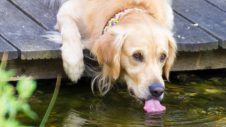 A dog licking at their paws is a common complaint seen amongst our vets. Unfortunately, there is no simple reason why they might engage in this behaviour. There is normally an initial reason for licking the area – an insect bite, a small cut or underlying allergies are common triggers. The situation then becomes complicated. Infection can set in and the act of licking can then become a compulsive behavioural habit. If the licking becomes a compulsive habit, often a small lesion appears and progressively gets worse. This is known as a ‘lick granuloma’
A dog licking at their paws is a common complaint seen amongst our vets. Unfortunately, there is no simple reason why they might engage in this behaviour. There is normally an initial reason for licking the area – an insect bite, a small cut or underlying allergies are common triggers. The situation then becomes complicated. Infection can set in and the act of licking can then become a compulsive behavioural habit. If the licking becomes a compulsive habit, often a small lesion appears and progressively gets worse. This is known as a ‘lick granuloma’What is a lick granuloma?
A lick granuloma is an open, irritant sore on the skin. They are normally found on the carpal (wrist) joints on the front legs of dogs. They are less commonly found in female dogs and are very rarely diagnosed in cats.
What causes a lick granuloma?
They are caused by a combination of different factors. There is normally an initial reason for licking the site like an insect bite or small cut. Infection can set in and the act of licking can then become a compulsive behavioural habit. Once this happens, the lick granuloma complex becomes a self-perpetuating problem. The leg becomes itchy, so they lick compulsively.
Because of the complex nature of the problem, treatment can be prolonged. A trial and error approach may be necessary. Not all dogs respond to the same treatment, so patience and persistence will be required to find the most effective solution.
Treatment
Treatment may involve one or more of the following:
- the use of toys and games to reduce any boredom or stress
- medication to help suppress the itchy sensation and therefore reduce the urge to lick
- physically preventing the act of licking by using bandages or Elizabethan collars
- oral or topically applied antibiotics to combat any infection present
- cryotherapy (freezing) or surgery to remove the affected skin
The complex nature of the problem dictates the need for a broad approach to the treatment. Despite this, and the long-term nature of any successful treatment, nearly all dogs will go on to fully recover from this troubling condition. Contact your local Greencross Vets for advice on lick granulomas.

 Greencross Vets
Greencross Vets 







